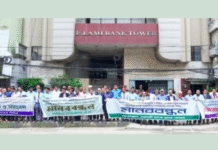The central bank has extended the time for businesses and industries to reschedule the bank loans they have defaulted on.
The move has been taken, through relaxing rules on classification, provisioning, to cut down on defaulted loan, with only seven months left before the government ends its term.
Bangladesh Bank Deputy Governor SK Sur Chowdhury said the initiative has been taken against the backdrop of ‘alarming’ rise in defaulted loans in recent times.

Central bank’s Banking Regulation and Policy Department issued two circulars to all scheduled banks on Wednesday with one extending the loan rescheduling time by maximum one year.
The other circular cut the provisioning rate against default loans, facilitating the banks to keep Tk 5 billion less than that required under the previous provision.
Chowdhury told a press conference on Wednesday term loans, short-term agriculture loans and micro-credits would enjoy the extended rescheduling facility.
“Thirty-six months have been fixed for rescheduling term loans for the first time, 24 months for the second time and 12 months for the third time,” he said.
Before the changes, the time was 24 months for the first, 18 months for second and 12 months for third rescheduling.
With the relaxation of the provision, a business or industry will now get six years to repay loans defaulted, against four years previously, if they are rescheduled in the three phases.
Rescheduling time for the loans considered ‘doubtful and bad’ has also been extended accordingly.
About provisioning, the Deputy Governor said five percent provision was being kept in case of special mentioned accounts (SMA).
“In place of that now 0.25 percent has been fixed for small and medium loans, 5 percent for consumer credits, 2 percent for house loans and credits given to professionals and investment banks (merchant banks, brokerage houses and stock dealers), and 1 percent for all other loans.”
The changes would require the banks to keep Tk 5 billion less in provision, he said and added they could invest the money in the capital market.
Chowdhury said though the economy was better than any previous time, default loans rose by 2 percent thanks to previous changes in the rule relating to such loans.
He said things on the business front were not well because of a lack of infrastructure. Gas crisis is pulling down industrial production. Business has come to a standstill amid the political tension. “In such a situation, loan classification rules have created an additional pressure.”
At the end of Jan-Mar quarter, default loans stood at Tk 510.2 billion, 11.9 percent of the total loans disbursed. The percentage was 10 in the previous quarter.
Source: Bd news24









